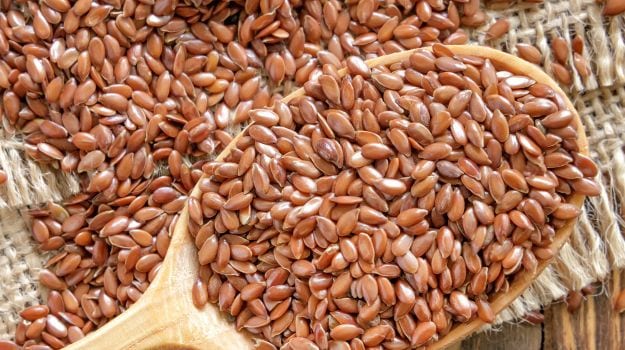As we age, dietary choices become crucial for skin, hair, and health. Flaxseeds, popular for their nutritional benefits, are packed with omega-3 fatty acids, promoting heart health, aiding digestion, regulating blood sugar, balancing hormones, and supporting weight management. However, consuming raw flaxseeds is not advisable due to their anti-nutrients, which can disrupt gut health. Instead, it’s best to dry roast them before consumption. Flaxseeds can be easily incorporated into various meals, such as parfaits, soups, baked goods, ice cream, and as coatings for chicken nuggets, enhancing both flavor and nutrition. Always consult health professionals for personalized advice.
As we age, we become increasingly aware of our dietary choices, ensuring that the foods we consume nourish our skin, hair, and overall well-being. From fresh fruits and vegetables to nuts and seeds, we select foods that are beneficial for our bodies. Among the various nutrient-dense options, flaxseeds have surged in popularity. These small, nutty seeds can be easily integrated into a variety of dishes and meals. But are you consuming these seeds correctly? While flaxseeds are an excellent addition to any diet, improper consumption may prevent you from reaping their full benefits. Let’s explore this further.
Also Read: From Weight Loss To Heart Health: 5 Flaxseed Oil Benefits You Must Know
How Do Flaxseeds Benefit Your Body
Flaxseeds boast an impressive nutritional profile. According to the book ‘Healing Foods’ by Dorling Kindersley, these seeds provide numerous health benefits.
1. Supports Heart Health
Rich in omega-3 fatty acids, flaxseeds help lower triglyceride levels and decrease the risk of heart disease, stroke, and high blood pressure.
2. Boosts Digestion
With a high content of mucilaginous fibre, flaxseeds promote gut health, prevent constipation, and facilitate smooth digestion.
3. Regulates Blood Sugar
The fibre in flaxseeds slows down digestion, helping to prevent sudden spikes in blood sugar levels, thus aiding in diabetes management.
4. Balances Hormones
Lignans found in flaxseeds help to regulate estrogen levels, which can be especially beneficial for women facing menopause, irregular menstrual cycles, and hormonal imbalances.
5. Aids in Weight Management
Flaxseeds are energy-dense and, due to their fibre content, can help you feel fuller for longer, making them a great addition for those aiming to lose weight.
Is It Safe to Consume Raw Flaxseeds?
While many believe that consuming flaxseeds raw maximizes their benefits, this is not entirely true. According to nutritionist Shalini Sudhakar, raw or unripe flaxseeds contain anti-nutrients, similar to other grains, which can disrupt gut health and nutrient absorption when consumed.
What Is The Best Method To Consume Flaxseeds?
The most effective way to eliminate the anti-nutrients is by applying heat. Experts suggest that for flaxseeds, dry roasting is the best option. To enhance their nutritional value and absorb the maximum benefits, dry roast your flaxseeds instead of consuming them raw.
How To Incorporate Flaxseeds Into Your Diet
Now that you understand the benefits of flaxseeds and the optimal way to consume them, let’s explore some great ways to integrate them into your daily meals.
1. Parfaits
Add flaxseeds to your parfaits along with yoghurt and fruits. This simple addition boosts nutritional value and helps keep you full longer—making it a fantastic breakfast or snack choice.
2. Soups
Instead of croutons or cream, try sprinkling flaxseeds on your soup. They provide a delightful crunch while elevating the fibre and nutrient content of the dish.
3. Baked Goods
Baking muffins, cookies, or cakes? Substitute dry fruits with flaxseeds for a subtle nuttiness, while also enhancing the health factor of your baked goods.
4. Ice Cream Toppings
Add a teaspoon of flaxseeds atop your ice cream for added texture and flavour, while also boosting the nutritional value of your treat.
5. Chicken Nuggets Coating
Instead of breadcrumbs, coat your chicken nuggets with flaxseeds before baking. This will not only create a crunchier texture but also add a nutritious element to your meal.
Also Read:Flaxseed Milk: Nutrition Facts About Non-Dairy Flax Milk And How To Make It At Home
Disclaimer: The information provided in this content is for general informational purposes only and should not be considered a substitute for professional medical advice. Always consult a qualified healthcare provider for advice specific to your situation. NDTV does not claim responsibility for this information.
